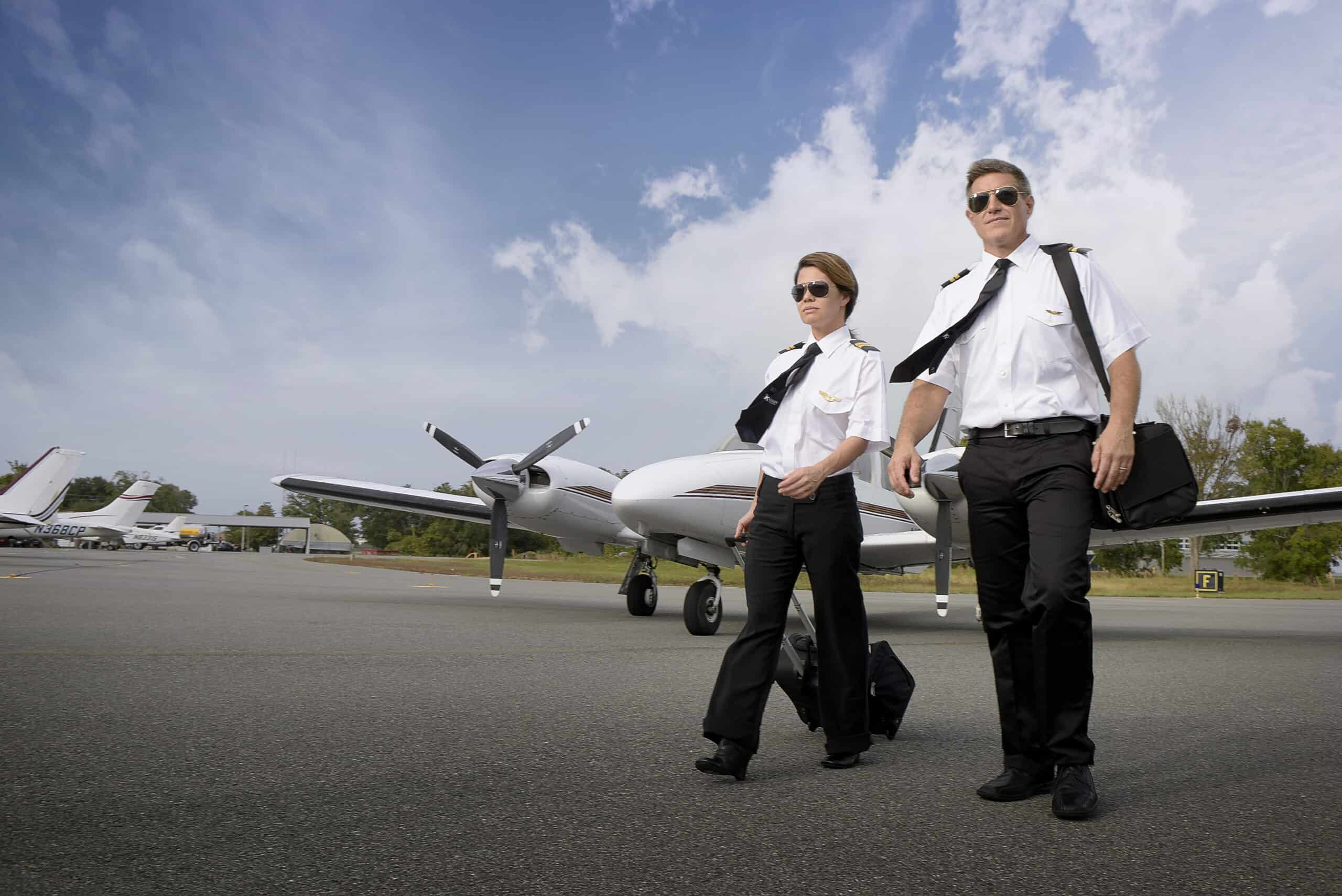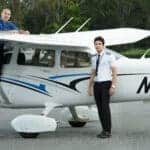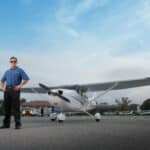Can You Become a Pilot Without a Degree? #1 Ultimate Guide

What Does It Take to Become a Pilot Without a Degree?
Many people assume that becoming a pilot requires a college degree, but that’s not true. Can you become a pilot without a degree? Yes, and many pilots have done it.
Airlines and aviation companies focus on flight training, certifications, and experience—not university degrees. If you have a Private Pilot License (PPL), Commercial Pilot License (CPL), and the required flight hours, you can qualify for a professional pilot career.
This guide breaks down the question can you become a pilot without a degree? The best training paths, airline hiring policies, and career opportunities. If you want to start flying without spending years in college, this is everything you need to know.
Can You Become a Pilot Without a Degree? Understanding the Requirements
The short answer is yes—you can become a pilot without a degree. Airlines and aviation authorities do not require a university degree for pilot certification. Instead, the focus is on flight training, licensing, and experience.
Basic Pilot Licensing Requirements
To work as a commercial pilot, you need to meet the licensing requirements set by aviation regulatory bodies. These include:
- DGCA (India) – Requires a Commercial Pilot License (CPL) issued by the Directorate General of Civil Aviation.
- FAA (USA) – Pilots must obtain an FAA CPL and Airline Transport Pilot License (ATPL) to qualify for airline jobs.
- EASA (Europe) – The European Union Aviation Safety Agency issues an EASA ATPL, which is mandatory for flying commercial airliners in Europe.
Each regulatory body has its own training and examination standards, but none make a college degree compulsory for pilot certification.
Flight Training vs. Formal Education
While some legacy airlines (such as United Airlines and Lufthansa) prefer pilots with a degree, most airlines focus on:
- Flight hours – A minimum number of logged flight hours is required for each certification.
- Skill assessments – Airlines conduct their own simulator and psychometric tests.
- Certifications – Holding a valid CPL and ATPL is more important than having a college degree.
Many successful pilots skip college and go straight into flight training, earning their licenses and securing airline jobs through experience, performance, and skill-based hiring.
Pathways to Becoming a Pilot Without a Degree
There are multiple ways to become a pilot without attending university. The best route depends on your budget, career goals, and preferred training method.
Flight Schools & Aviation Academies
Flight training academies provide a direct-to-license pathway, allowing students to start as soon as they complete 10+2 (with Physics and Mathematics). These academies offer:
- Private Pilot License (PPL) – The first step in pilot training.
- Commercial Pilot License (CPL) – Required for professional flying.
- Instrument Rating (IR) and Multi-Engine Rating (MER) – Essential for airline careers.
Many DGCA-approved flight schools in India and internationally like Florida Flyers Flight Academy India offer fast-track programs, allowing students to complete training in 12–18 months without requiring a university degree.
Private Pilot License (PPL) to Commercial Pilot License (CPL) Route
A common pathway for students without a degree is:
- Obtain a PPL – This allows you to fly private aircraft but not commercially.
- Build Flight Hours – Accumulate the required flight hours to qualify for CPL training.
- Earn a CPL – This is mandatory for working as a professional pilot.
- Get Additional Ratings – Add-ons like Instrument Rating (IR) and Multi-Engine Rating (MER) improve employability.
This approach allows pilots to enter the aviation industry sooner and start gaining experience.
Airline Cadet Programs
Some airlines offer cadet programs where candidates are selected based on aptitude tests rather than academic qualifications. These programs provide:
- Fully structured flight training with guaranteed employment upon completion.
- No degree requirement, only meeting DGCA or FAA training standards.
- Financial aid or sponsorship for eligible students.
Examples include IndiGo Cadet Program, SpiceJet Cadet Pilot Program, and Qatar Airways Cadet Program.
Military & Government Training Programs
In some countries, government-backed programs train pilots for free in exchange for a service commitment.
- Indian Air Force (IAF) Flying Branch – Trains pilots through AFCAT (Air Force Common Admission Test).
- US Air Force & Navy Pilot Training – No college degree required for specific military aviation roles.
- Government-Sponsored Aviation Academies – Some states offer financial assistance to train pilots.
This pathway allows candidates to become professional pilots without personal training expenses, though some may have to serve in the military before transitioning to commercial aviation.
By choosing the right pathway, you can become a pilot without a degree and still secure a high-paying career in aviation. The key is to focus on training, experience, and licensing, as these are the most important factors in pilot recruitment.
Do Airlines Require a Degree to Hire Pilots?
A college degree is not a mandatory requirement to work as a commercial airline pilot. Most airlines in India and globally focus on flight hours, licensing, and experience rather than formal education. However, some legacy carriers prefer candidates with a degree for career advancement.
Airlines That Don’t Require a Degree
Several airlines in India and internationally hire pilots based on flight training and certifications alone:
- IndiGo – Hires pilots with a DGCA Commercial Pilot License (CPL) and the required flying hours. No degree is needed.
- SpiceJet – Focuses on DGCA licensing and simulator assessments for recruitment.
- Air India (Certain Roles) – While some positions favor degree holders, direct CPL holders are also hired.
- AirAsia India & Vistara – Accept candidates with CPL and relevant flight experience without requiring a degree.
- Ryanair & Emirates – International airlines that prioritize flight experience over university education.
- Regional and Cargo Airlines – Smaller airlines primarily consider experience, not formal education.
For most of these airlines, selection is based on DGCA regulations, simulator assessments, and psychometric tests, rather than university qualifications.
Airlines That Prefer or Require a Degree
Some legacy carriers, especially in the U.S. and Europe, prefer candidates with a bachelor’s degree in aviation, engineering, or related fields:
- United Airlines & Delta (USA) – Prefer pilots with degrees for senior positions but accept non-degree holders with high flight experience.
- Lufthansa (Germany) – Often favors candidates with an aviation-related degree for long-term career growth.
- Singapore Airlines & Cathay Pacific – Consider a degree beneficial but do not make it mandatory for recruitment.
Why Some Airlines Prefer a Degree
- Career Progression – A degree can help pilots move into senior roles like Captain, Fleet Manager, or Training Instructor.
- Competitive Edge – In highly competitive job markets, a degree might enhance employability, especially with global airlines.
- Diversification – Some pilots transition into aviation management, safety, or operations, where a degree may be advantageous.
While a degree may offer long-term career benefits, it is not required for most airline pilot jobs, especially in India and the Middle East. Flight training, certifications, and experience remain the most critical factors.
Pilot Careers Without a Degree: What Are Your Options?
Can you become a pilot without a degree and still have a successful career? Yes. Many pilots in India build their careers in cargo, charter services, private aviation, flight instruction, regional airlines, and government contracts without ever attending college.
These career paths focus on flight training, licensing, and experience rather than formal education. As long as you hold the necessary DGCA certifications, you can secure a stable, high-paying job in aviation.
Below are some of the best career options available for pilots without a degree in India.
Cargo and Charter Pilots
Cargo airlines and charter services provide alternative career paths for pilots who prefer to work outside commercial passenger aviation. These roles often come with flexible schedules and competitive salaries.
Cargo Airlines such as Blue Dart Aviation, DHL, and FedEx operate in India and hire pilots with CPL and ATPL qualifications. These jobs typically involve flying cargo aircraft on domestic and international routes.
Private Charter Services like Club One Air, JetSetGo, and Taj Air offer pilot positions for business jets and luxury travel services. These companies often hire pilots based on experience and skill, not academic background.
Private and Corporate Aviation
Can you become a pilot without a degree and still fly private jets? Absolutely. Many corporate aviation departments hire pilots solely based on flight experience and licensing.
Luxury charter companies and business aviation operators frequently recruit pilots for private jet services. These roles involve flying high-net-worth individuals, corporate executives, and VIP clients.
Private jet pilots often earn higher salaries and enjoy a better work-life balance compared to airline pilots. Unlike commercial aviation, private aviation offers more flexibility in flight schedules.
Flight Instructors
Many pilots without degrees start their careers as flight instructors, allowing them to build flight hours while earning a salary.
To become a certified flight instructor (CFI) in India, you need a Commercial Pilot License (CPL) and an Instructor Rating (IR). These qualifications allow pilots to train new students at DGCA-approved aviation academies.
Flight instruction is one of the best ways to gain experience before transitioning to airline or corporate aviation roles. Many pilots use this stepping stone to qualify for higher-paying jobs.
Regional Airline Pilots
Regional airlines provide another great opportunity for pilots without degrees. These airlines focus more on flight experience, CPL certification, and simulator performance than on academic qualifications.
In India, carriers such as TruJet and Alliance Air regularly hire pilots who meet DGCA flight training requirements. Many regional airlines do not require a college degree for first officer positions.
Starting with a regional airline allows pilots to gain valuable experience and flight hours, making it easier to transition into larger commercial airlines in the future.
Government and Military Contracts
Another way to become a professional pilot without a degree is through government aviation contracts. These include positions in law enforcement, emergency response, and disaster relief operations.
Government agencies sometimes hire pilots for border patrol, aerial surveillance, and public safety missions. Some state governments and law enforcement agencies offer pilot jobs without a formal degree requirement.
These roles often come with stable salaries, benefits, and long-term career security, making them a solid alternative to airline jobs.
Can you become a pilot without a degree and still have a thriving career in aviation? Yes. The aviation industry prioritizes flight training, DGCA licensing, and hands-on experience over university education.
From cargo airlines and corporate aviation to flight instruction and regional carriers, there are multiple pathways for non-degree holders to succeed as professional pilots.
The key to success is earning the right certifications, building flight experience, and choosing a career path that aligns with your long-term goals. With the right training and commitment, you can achieve a rewarding aviation career—without ever needing a college degree.
Can You Become a Pilot Without a Degree? The Pros and Cons
Many aspiring aviators wonder if they can become a pilot without a degree and still secure a successful career. The answer is yes. Most airlines and aviation companies focus on flight training, certifications, and experience rather than formal education. However, while skipping college can save time and money, there are also challenges to consider.
For those who want to become a pilot without a degree, it’s essential to weigh the advantages and limitations. Some career paths may offer faster entry into the aviation industry, while others might require additional qualifications for long-term growth.
Here’s a closer look at the benefits and challenges of pursuing a career as a pilot without a degree.
Advantages of Choosing to Become a Pilot Without a Degree
1. Faster Career Entry: Earning a Commercial Pilot License (CPL) takes 12 to 18 months, whereas a university degree typically requires three to four years. Pilots who skip college can start working sooner and build flight hours earlier than their degree-holding peers.
2. Lower Financial Burden: A university education can be expensive, but those who become a pilot without a degree avoid tuition fees and student loan debt. Instead, they can invest directly in flight training, which is the most critical qualification for a pilot.
3. Airlines Prioritize Experience Over Degrees: Most airlines, cargo operators, and private aviation companies focus on hiring pilots with the required CPL, ATPL, and flight hours rather than academic qualifications. In India, airlines like IndiGo, SpiceJet, and Air India (for certain roles) hire pilots based on flight training performance and licensing alone.
Challenges of Choosing to Become a Pilot Without a Degree
1. Some Airlines Prefer Degree Holders for Leadership Roles; Although many airlines hire pilots without a degree, some legacy carriers and international airlines prefer candidates with a degree for long-term positions, including captain and managerial roles.
2. Limited Career Flexibility Outside Aviation: Choosing to become a pilot without a degree means fewer career options outside flying. Pilots who later want to transition into aviation management, safety, or regulatory roles may find that a degree is required.
3. Competitive Job Market: In a highly competitive industry, pilots with both experience and a degree may have an edge when applying for international airline jobs. Some government and military aviation roles also favor candidates with higher education qualifications.
Should You Get a Degree Later? Exploring Future Education Options
While it’s possible to become a pilot without a degree, some pilots choose to earn a degree later in their careers. Many universities offer part-time, online, or aviation-related degree programs that pilots can complete while working.
Studying While Working as a Pilot
Pilots can pursue a degree while flying by enrolling in distance learning or online university programs. These options allow them to continue working while earning a qualification that may be useful for future career growth.
Popular degree programs include:
- Aviation Management – Helps pilots transition into airline operations or executive roles.
- Aerospace Engineering – Suitable for pilots interested in aircraft design or technical positions.
- Business Administration (MBA) – Beneficial for pilots looking to move into aviation business strategy.
Airline-Sponsored Degree Programs
Some airlines offer sponsored degree programs to pilots who wish to expand their qualifications. These programs allow pilots to gain additional education without financial burden.
- IndiGo and Air India have career development initiatives that provide training and educational opportunities.
- International airlines like Emirates and Lufthansa sometimes fund degree programs for pilots aiming for management positions.
Choosing to become a pilot without a degree is a viable career path. Many airlines and aviation companies hire pilots based on flight training, experience, and licensing rather than academic qualifications. However, for pilots considering long-term career flexibility or leadership roles, earning a degree later may be a beneficial step.
For those who want to fly as soon as possible, skipping a degree and focusing on CPL training, type ratings, and flight hours is the fastest way to enter the aviation industry. The right decision depends on career goals, financial situation, and future aspirations in aviation.
Conclusion: Become a Pilot Without a Degree – Final Thoughts
Many aspiring aviators wonder if they can become a pilot without a degree and still have a successful career. The answer is yes. A university degree is not a mandatory requirement for becoming a professional pilot. Instead, airlines and aviation companies focus on flight training, certifications, and experience as the primary qualifications for hiring.
For those looking to become a pilot without a degree, the most important step is to enroll in a DGCA-approved flight school, obtain a Commercial Pilot License (CPL), and build the required flight hours. This pathway allows pilots to enter the industry faster and start flying professionally without spending years in college.
Choosing to become a pilot without a degree has clear advantages, such as lower education costs, faster career entry, and a focus on practical skills. However, pilots should also consider their long-term goals. While a degree is not required for most pilot jobs, some legacy airlines and senior positions may prefer candidates with higher education.
The best approach is to focus on professional training first. Those who later wish to pursue aviation management or leadership roles can always earn a degree through online or part-time programs while working. This way, pilots can start flying early while keeping future career options open.
If you are determined to become a pilot without a degree, the key is to start with proper flight training, gain experience, and continuously improve your skills. With the right preparation and dedication, a rewarding career in aviation is well within reach.
Contact the Florida Flyers Flight Academy India Team today at +91 (0) 1171 816622 to learn more about the Private Pilot Ground School Course.



